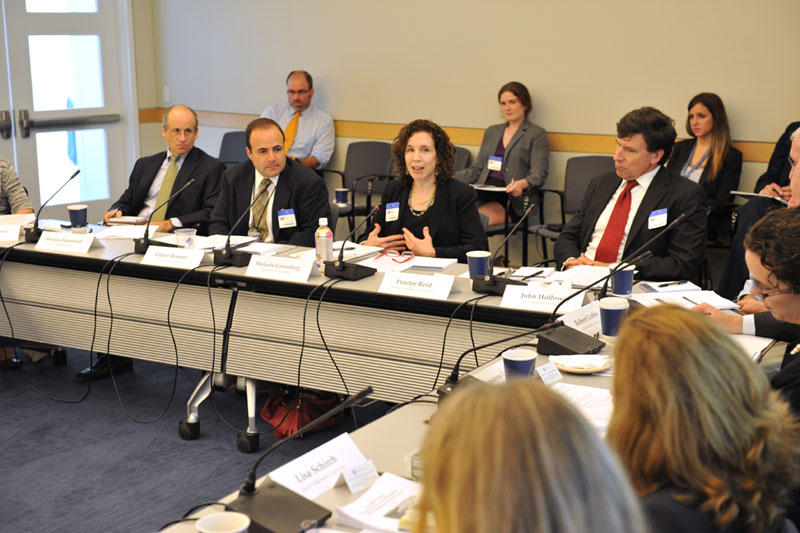In partnership with the National Academy of Engineering, the U.S. Institute of Peace (USIP) on May 23 hosted a workshop with experts from government and the NGO community to examine “Using Data Sharing to Improve Coordination in Peacebuilding.”

In partnership with the National Academy of Engineering, the U.S. Institute of Peace (USIP) on May 23 hosted a workshop with experts from government and the nongovernmental (NGO) community to examine “Using Data Sharing to Improve Coordination in Peacebuilding.” The day-long workshop examined a longstanding problem: How can we make peacebuilding interventions more effective by improving how different stakeholder organizations cooperate with each other? Insights on civilian-military interaction stemming from America’s long engagements in Iraq and Afghanistan, coupled with technological innovations in the acquisition, sharing, analysis and representation of information, have all placed a new perspective on the problem.
Melanie Greenberg, the president and CEO of the Alliance for Peacebuilding and co-chair of the workshop, pointed out that the problem is not primarily technical but rather organizational: It is caused by the varying missions, values and processes used by different organizations working in conflict zones. Co-Chair Elmer Roman, oversight executive within the Office of the Secretary of Defense, agreed. He emphasized the need to understand how these non-technical factors impeded efficient cooperation among organizations operating in post-conflict environments. Experts on coordination, civilian-military interaction, data sharing and various technological disciplines noted the multiple causes of ineffective coordination, and they presented different approaches to enhance the benefits of data sharing.
Specialists briefing at the morning sessions emphasized the importance of trust building as a key element of work in conflict zones. Ambassador Robert Loftis, currently an interagency professional in residence at USIP, said that “any tool or framework requires a continual renewal of trust” among the users through ongoing discussion. Randy Tift of World Vision said that “trust building is not only the basis for NGO security in conflict zones, it is also a requirement for NGO operational effectiveness.” Finally, Susanna Campbell of Columbia University approached trust from a different direction, noting that “in a conflict environment that places a premium on adaptability and flexibility, inter-organizational dialogue is vital for coordination and success.”
In the next workshop session, Lisa Schirch of 3P Security emphasized trust and “a shared understanding of operational context” as the basis for using information successfully in peacebuilding. Marcia Hartwell, a visiting scholar at USIP, added that “data sharing could be the basis for long-term trust building.” Training programs and working groups could be used to humanize the technology.
In the afternoon session, experts on data architecture, acquisition, analysis and design presented different ways to enhance the impact of data. Steven Lowe of the U.S. Department of Agriculture described data frames as an effective means to capture the differing values of contributors to a data-sharing activity. Niall Keleher of Innovations for Poverty Action described ongoing work to broaden the application of their randomized control methods to peacebuilding and development activity. Patrick Vinck discussed the Harvard Humanitarian Initiative’s open source tool kit to accelerate the collection and use of data.
The workshop included a demonstration of data-sharing systems developed by the U.S. Department of Defense and the U.S. Agency for International Development. Mark Hainsey presented the motivation for the UNITY project, and Steve Wood demonstrated the tool itself. The consensus was that this represents a strong first step toward a working system but that more attention needs to be paid to how to create trust both in the tool and in other stakeholders using the tool. Participants made various suggestions on how to improve the tool and the context for its use.
For such data-sharing systems to become widely adopted and used, the government and NGOs will probably need to reconsider how they organize their work with stakeholders. Technology has a role in raising the value of cooperation by creating tools that address widespread problems faced by organizations that work in combat zones. Those problems include learning, monitoring and evaluation.
The workshop was part of a wider partnership between USIP and the National Academy of Engineering. In the coming months, workshops will be conducted that address other pressing problems in peacebuilding that may have scientific or technological solutions.